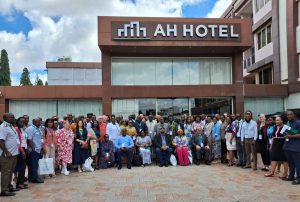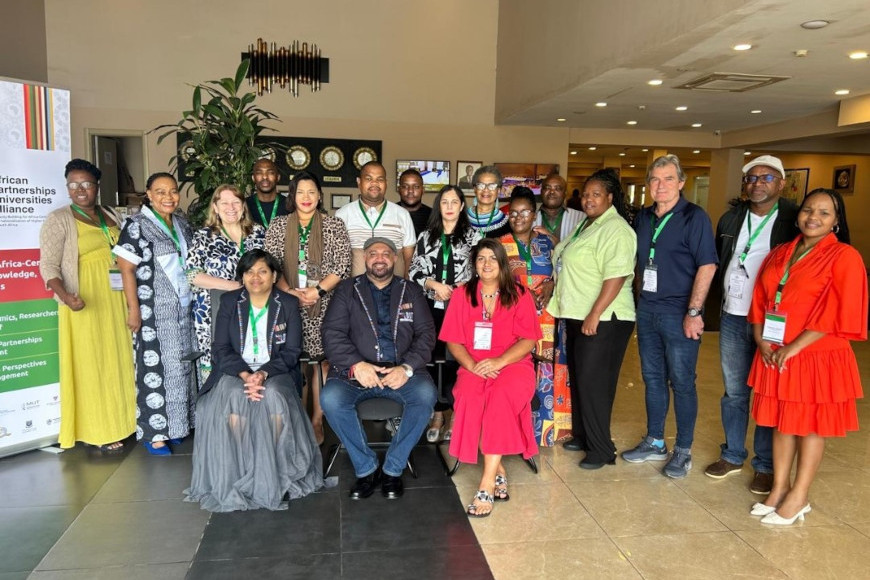In alignment with DUT’s ENVISION2030 commitment to developing “engaged and productive glocal citizens,” the International Education and Partnerships (IEP) unit continues to forge ahead in establishing mutually beneficial partnerships across the continent. This dedication to ensuring “our people participate in the development of our region, country and the world” that is stipulated by our DUT’s statement of intent of our ENVISION2030 was prominently displayed at the recent 14th African Network for Internationalisation of Education (ANIE) Conference in Accra, Ghana.
The conference participation marked a significant milestone for the African Partnerships Universities Alliance (APUA), an Africa-centred internationalisation project proudly led by DUT in collaboration with nine South African universities: Cape Peninsula University of Technology, Mangosuthu University of Technology, University of Johannesburg, University of Limpopo, University of KwaZulu-Natal, University of Zululand, University of the Western Cape, Rhodes University, and Walter Sisulu University. This initiative, funded by the Department of Higher Education and Training (DHET) through its University Capacity Development Programme (UCDP), aims to expand intra-Africa collaboration in South African higher education to develop Africa-centred scholarship and knowledge.
Under the leadership of Dr. Lavern Samuels, Director of IEP and President of the International Education Association of South Africa (IEASA), the DUT team, including Dr. Divinia Jithoo, Huba Boshoff, and Nonhle Mdlalose, led a delegation of 30 representatives from the participating universities to Ghana. This strategic visit, the first of its kind for the project, demonstrated the consortium’s commitment to strengthening Africa-centred university partnerships.
The delegation facilitated a pre-conference workshop titled “Gateway to South Africa: Co-creating Models for Strengthening Pan-African University Partnerships.” Through interactive sessions and thematic discussions, participants explored critical aspects of Africa-centred internationalisation, including transformation and leadership, student and staff mobility, digital solutions for virtual learning, and the reclamation of African voice and agency in international partnerships.
“This initiative represents a transformative approach to how African universities collaborate,” said Dr. Samuels. “By fostering partnerships that address continental challenges while promoting academic excellence, we’re actively contributing to the development of Africa-centred knowledge systems.”
 The pre-conference workshop drew participants from across the continent and beyond, including Ghana, Kenya, Rwanda, Burundi, Guinea and the United States of America, fostering a truly pan-African dialogue on internationalisation in higher education. The workshop’s innovative format featured stationed thematic breakout sessions and a partnering fair, where participants engaged in critical discussions about the future of African higher education partnerships.
The pre-conference workshop drew participants from across the continent and beyond, including Ghana, Kenya, Rwanda, Burundi, Guinea and the United States of America, fostering a truly pan-African dialogue on internationalisation in higher education. The workshop’s innovative format featured stationed thematic breakout sessions and a partnering fair, where participants engaged in critical discussions about the future of African higher education partnerships.
The project brought home key takeaways that reflect a diverse group of continental voices. These include the importance of moving from opportunistic to strategic partnership selection, the need for sustainable funding models that reduce dependency while building institutional capacity, and the critical role of co-creation in developing truly equitable partnerships that centre on African knowledge systems and epistemologies.
This successful engagement in Ghana, which attracted approximately 95 delegates from various African institutions and countries, provided an invaluable platform for networking and dialogue. The robust participation and engagement demonstrated the growing momentum toward strengthening intra-African academic collaboration, setting a strong foundation for APUA’s future strategic visits and partnerships across the continent.
Pictured: DUT IEP Project Team and South African Partner Universities Team members at the ANIE Conference in Ghana, October 2024.

